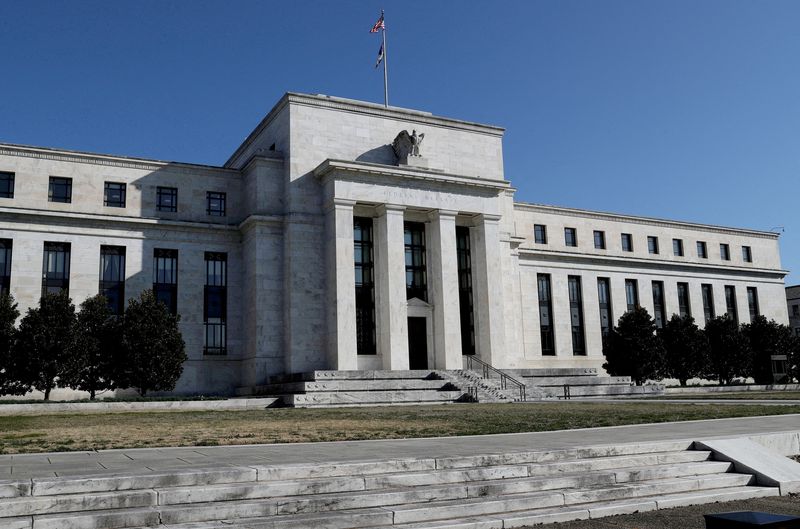(Reuters) - The U.S. Federal Reserve meets after global banking turmoil has left deep scars on financial markets - with the risk of more to come.
Lender Credit Suisse (SIX:CSGN) will likely dominate a Swiss National Bank meeting and the Bank of England might place its inflation fight on hold.
Here's a look at the week ahead in markets from Rae Wee in Singapore, Lewis Krauskopf in New York and Dhara Ranasinghe, Amanda Cooper and Karin Strohecker in London.
1/ROCK AND A HARD PLACE
After its laser focus on trying to curb inflation, the Fed must juggle that with a banking crisis at its two-day meeting ending Wednesday.
A week ago, investors braced for a return to a hefty 50 basis-point rate hike after Chair Jerome Powell said the Fed may have to raise rates to more than expected if data showed a still-hot economy.
The mood changed after the failure of U.S. lender Silicon Valley Bank (SVB) sparked contagion concerns. Traders now price in either a small 25 bps hike or none at all.
February inflation data in line with expectations offered some relief, though the 6% annual rise was still above the 2% target.
Fed's path to a terminal rate https://www.reuters.com/graphics/GLOBAL-MARKETS/byvrlmlbeve/chart.png
2/ MOUNTAINS HIGH, VALLEYS DEEP
The dust had not settled from the collapse of SVB when a slump in shares and bonds at crisis-hit Credit Suisse intensified fears about a global banking crisis and rocked markets. The Swiss National Bank - much like the Fed - stepped in quickly to reassure investors, but febrile markets are wary of what lies ahead.
The SNB stopgap has worked for now, but the quest is on for a lasting solution. Some predict Credit Suisse could merge with peer UBS to rebuild Switzerland's reputation as a finance safe haven. Its policy response will be watched globally by others anxious to avoid repeat situations.
Credit Suisse will also take centre stage when the SNB meets on Thursday. The bank is expected to lift rates by 25 bps or even 50 bps to tackle inflation.
Credit Suisse goes off piste https://www.reuters.com/graphics/CREDITSUISSEGP-STOCKS/gkplwbwdwvb/chart.png
3/ARE WE THERE YET?
The Bank of England could be on the verge of wrapping up a 17-month campaign of raising rates to combat inflation. Traders place a 60% chance the bank will lift rates by a quarter point to 4.50% and a 40% chance they will hold fire on March 23.
Inflation remains in double digits, but there are signs that some price pressures are easing. With warmer weather approaching, natural gas prices, which have dropped by 70% in the last three months, are less of a worry. Labour market pressures - including wage inflation - are starting to soften.
The economy is fragile, borrowing costs are high and workers are dealing with a steep fall in real wages. Money markets show that either way, traders do not expect the BoE to deploy much more firepower. The question is - has the BoE done enough to put the inflation genie back in its bottle?
Inflation takes another bite out of pay in Britain https://www.reuters.com/graphics/GLOBAL-MARKETS/THEMES/gkplwbwkmvb/chart.png
4/OVER TO YOU, KAZUO
The banks rout has dragged Japanese government bond yields lower and focused expectations on when the Bank of Japan could further loosen the shackles around long-term bond yields - giving dovish policymakers room to defend their ultra-loose policy stance.
Consumer price data on Thursday could change that picture. Core inflation is running at four-decade highs - twice the central bank's 2% target. The wage outlook has also improved - something policymakers have long pointed to as the missing piece in the inflation puzzle.
In the coming days, Japan's top companies will agree their largest pay increases in a quarter century as they conclude the closely-watched annual wage talks known as "shunto". Whether smaller companies, which employ seven out of 10 of workers, can afford to follow their lead, remains to be seen.
Japan's real wages drop at fastest pace since 2014 https://www.reuters.com/graphics/JAPAN-ECONOMY/WAGES/gdpzqmaamvw/chart.png
5/EVERYTHING EVERWHERE
For those trading, investing in - and reporting on - financial markets, recent days felt like 'Everything Everywhere All at Once' - the title of the film that dominated the Oscars.
In the space of days, the SVB collapsed, sparking turmoil in regional banks, government bond yields slid in a massive dash to safety and shares of Credit Suisse, a systematically important European bank, tanked.
More of the same could be in store for markets unnerved by some of the biggest ructions since the 2008 financial crisis, with investors alert for what could break next under hefty rate hikes.

The response is also key. A $30 billion lifeline for First Republic Bank has eased fears, and central banks (the Fed and the SNB) have helped to calm things down. There may be more intervention if turbulence takes over again.
Market fear gauge jumps https://www.reuters.com/graphics/GLOBAL-MARKETS/THEMES/myvmoboanvr/chart.png
(Graphics by Pasit Kongkunakornkul, Vineet Sachdev, Sumanta Sen, Kripa Jayaram and Vincent Flasseur, Compiled by Karin Strohecker; editing by Barbara Lewis)